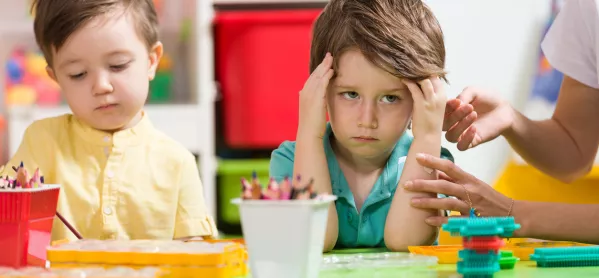- Home
- Teachers have no magic wand to wave away anxiety
Teachers have no magic wand to wave away anxiety

For the first few years of my school life, I was that kid who clung on to his parents legs and refused to go in; the child who had to be gently coaxed and persuaded to walk into the classroom each morning.
I suspect that every teacher will, at some point in their careers, have come across a child like me, one who is anxious about coming into school.
Looking ahead to September, my suspicion is that we may see more pupils like that than usual.
Impact of the coronavirus
By the start of the autumn term, some children will have been out of school for almost six months. From a child’s perspective, six months can feel like an eternity.
Each will have had a unique experience at home, but all are likely to have adjusted to a new way of life.
The shift from home to school can be a challenge for many children after a standard six-week summer break, but by September we will be looking at around 25 weeks out of school for some pupils - this is bound to have an impact.
Even those who have been able to engage in remote learning will have become used to a life without school in the usual sense of the word.
Identify the problem
I don’t want to exaggerate the scale of the problem or suggest that children will have been irreparably damaged by this experience.
Equally, I’m sure there will be plenty of children who will bound through the classroom door with ease and confidence.
However, it won’t be the case for all - I suspect it wouldn’t have been the case for the six-year-old version of me, and I am fairly confident there will be children in September more anxious than usual about going back.
This will, of course, be exacerbated by the new environment they walk into. Classrooms will likely look and feel different, drop-off will necessarily be more regimented, and many children will have missed out on the crucial transition activities that usually take place in the summer term.
Practical steps
So, what can teachers do to support children who find returning to school difficult? Perhaps the best thing is to anticipate and be prepared for the fact that many children will find this September even more difficult than usual.
While many transition activities will have been unavoidably cancelled, it is worth considering if there is a way to help prepare pupils who are currently at home. A letter or photo sent from next year’s teacher and TA is one simple way to help children begin to prepare for the new year. Photos of the new classroom set out as it will be in September, or outdoor play and lunch areas could help, too.
It may also be worth speaking to the existing teachers to identify children who are most likely to be nervous and reaching out to those families now. In some cases, a social story might be worth considering.
Some short and clear advice for parents about how best to prepare their children over the summer might be worth considering. This could be as simple as asking them to remind their children about the daily routine or practising the journey to and from school a few times.
Little steps
When September does finally come around, there is plenty schools can do to help. Children who are finding it hard to come into school may benefit from having a classroom buddy to stick with, or an agreed adult to meet them at the door each morning.
All of these sorts of support mechanisms that schools will be very familiar with could come with new logistical challenges as a result of the Covid-19 restrictions, so they are worth thinking through in advance.
For many children, these relatively straightforward actions will be enough to help them to settle back into school life over the first few weeks.
However, there are others who may need greater support. Many schools have something akin to a dedicated “home school link worker” who can offer advice and support to both teachers and families. Education psychologists or school nurses may be able to offer support too.
Sadly, there is no magic wand to wave when it comes to reducing the anxiety some children will feel about returning. However, by preparing now, schools will be well-placed to effectively support those pupils at the start of September.
James Bowen is director of policy at the NAHT
Keep reading for just £1 per month
You've reached your limit of free articles this month. Subscribe for £1 per month for three months and get:
- Unlimited access to all Tes magazine content
- Exclusive subscriber-only stories
- Award-winning email newsletters



